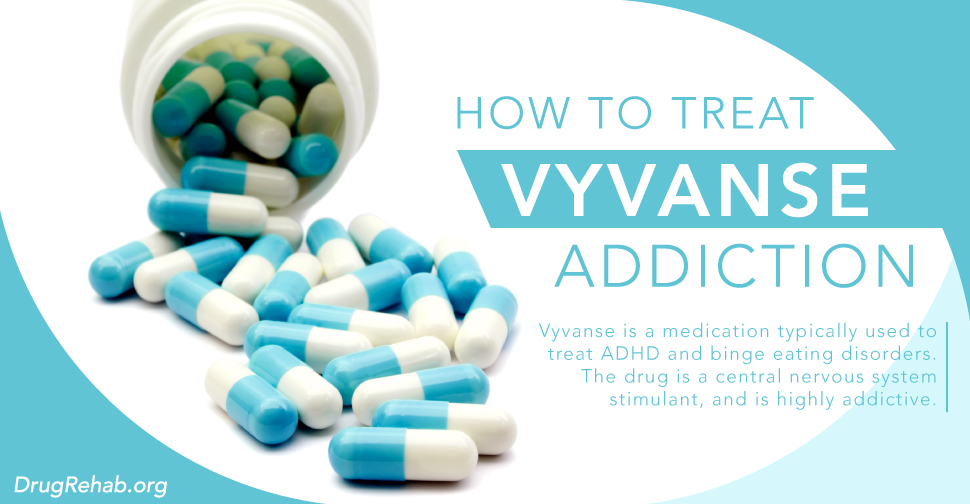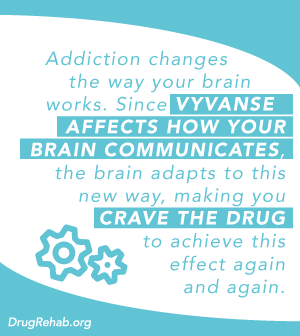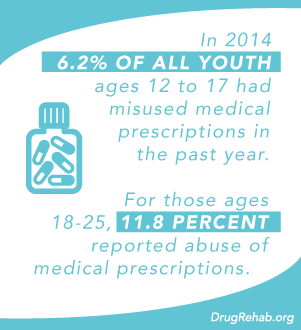
Vyvanse is the brand name for the medication Lisdexamfetamine. This drug is prescribed to treat symptoms of attention deficit hyperactivity disorder (ADHD), but can also be used to treat binge eating disorder.
Vyvanse belongs to a class of drugs called central nervous system (CNS) stimulants, which work to change certain chemical levels in the brain. CNS stimulants usually work one of two ways:
Increasing certain “happy” chemicals in the brain, such as serotonin or dopamine.
Blocking the brain from reabsorbing these “happy” chemicals.
The first type creates an influx of the happy chemicals, and creates the feeling of euphoria and increased energy and alertness—results that foster addiction. Cocaine and amphetamines belong to this class. The second type helps control mood and behavior by slowing brain communication and regulating certain body functions, also fostering addiction. Vyvanse belongs to the second type.

While Vyvanse can be used safely to treat some disorders, it is highly addictive and use of it should be monitored. The U.S. National Library of Medicine warns, “Lisdexamfetamine can be habit-forming. Do not take a larger dose, take it more often, take it for a longer time, or take it in a different way than prescribed by your doctor.”
What Are The Side Effects?
All medications come with their own set of side effects, but abuse can enhance these effects. Consequences of abuse range from moderate to severe, and may include:
- Anxiety, tremors
- Constipation, diarrhea
- Dizziness
- Dry mouth
- Headache
- Increased sweating
- Insomnia
- Irritability
- Loss of appetite, weight loss, dry mouth
- Nausea, vomiting, stomach cramps
What Are The Signs Of Addiction?
 Signs of addiction differ for each person, but if you suspect you may be at risk, here are some signs. First, have you developed tolerance? This happens when you can no longer feel the effects of a drug when you take it. With time, you may feel you have to take more of the drug to feel the same effects.
Signs of addiction differ for each person, but if you suspect you may be at risk, here are some signs. First, have you developed tolerance? This happens when you can no longer feel the effects of a drug when you take it. With time, you may feel you have to take more of the drug to feel the same effects.
Eventually, you may not feel the effects at all. If you stop taking the drug, or can’t get it for some reason, you may experience withdrawal. Some symptoms of withdrawal include headaches, nausea, and anxiety when not taking the drug.
If all that weren’t troubling enough, addiction changes the way your brain works. Since Vyvanse affects how your brain communicates, the brain adapts to this new way, making you crave the drug to achieve this effect again and again. Cravings, mounting tolerance, and withdrawal that punishes you when not taking the drug are often the reasons people continue to abuse substances rather than seek help.
Addiction can have some dire consequences, though. The immediate ones may affect your health, personal relationships, and finances. With prolonged abuse, you may find your health in jeopardy, have trouble at work or school, get in trouble with the law, or even do things you wouldn’t do if not for addiction.
One of the most dangerous possible outcomes of addiction is overdose. Before addiction leads to that point, it’s best to seek medically supervised treatment.
What Are The Signs Of Overdose?
If you or someone you know is experiencing overdose, seek help right away. Overdose is a medical emergency, and should be treated as one. The following are signs to watch for, as listed by the University of Michigan:
- Aggression
- Confusion, hallucinations, panic attacks
- Dark-colored urine
- Diarrhea
- Depression
- Fatigue
- Fever
- Flu-like symptoms
- Increased breathing
- Irregular heartbeats
- Lightheadedness, fainting
- Nausea, vomiting, stomach pain
- Muscle pain, soreness, twitching, tremors, or weakness
- Restlessness
- Seizures
- In extreme cases, coma
Who Is At Risk?
Vyvanse is usually prescribed for children and adolescents with ADHD issues or binge eating disorders. It’s important to always carefully monitor medication for your child or teen, but even more so when the medication has such great risk of addiction.
What we have to recognize is that not just children are at risk for abuse of this medication. The Substance Abuse and Mental Health Services Administration (SAMHSA) explains that, “many young people think that prescription drugs are safer than illegal drugs because they are prescribed by a physician, dispensed by a pharmacist, and manufactured by pharmaceutical companies.”
 Unfortunately, this isn’t always true, especially when use of a drug turns to abuse. For example, in 2014 6.2 percent of all youth ages 12 to 17 had misused medical prescriptions in the past year. For those ages 18-25, 11.8 percent reported abuse of medical prescriptions.
Unfortunately, this isn’t always true, especially when use of a drug turns to abuse. For example, in 2014 6.2 percent of all youth ages 12 to 17 had misused medical prescriptions in the past year. For those ages 18-25, 11.8 percent reported abuse of medical prescriptions.
These numbers are lower for the age groups above age 26, but still affect these groups as well. Overall, the younger age groups may be most affected by prescription drug abuse. Many first obtain these drugs from a family member or friend.
We can do our part in helping to reduce these numbers: keep prescriptions in a secure place, dispose of them when finished, monitor prescription use in youth. For those who already suffer from addiction, we can provide support by helping to secure treatment.
What Treatments Are Available?
Addiction treatment isn’t what it used to be, and that’s a good thing. Research of recent years have focused on new and improved methods for helping people heal from addiction, and the result is modalities of treatment that truly work.
The best rehab centers, like the ones you’ll find at DrugRehab.org, design treatment plans based on your individual needs. What does this mean? Women have different treatment needs than men. People who suffer from abuse of multiple substances have different treatment needs than someone who needs help overcoming one substance. And those with mental health issues will need help managing those issues while healing from addiction.
The best rehab centers help you build a comprehensive plan that works to treat all aspects of your health: mind, body, and spirit. Addiction doesn’t just affect your body, or just your brain, so neither should treatment.
Instead, it should provide ways for you to heal your body through detoxification, nutrition guidance, and fitness or exercise. It should provide ways to heal your mind through counseling, skill-building, and therapy. It should help heal your spirit through recognition of your capabilities, motivation, and increased self-confidence and sense of self.
Some of the treatment methods offered at our rehab centers, which embody this holistic approach include:
- Gender-based treatment
- Dialectical Behavioral Therapy
- Cognitive Behavioral Therapy
- Counseling: group, individual, and family
- Holistic healing
- Medication assisted therapy
- Medically supervised detoxification
- Adventure therapy
- Aftercare support
- Intervention services
Let Us Help You
Confronting addiction head on can be intimidating. You might feel ashamed, or like you can’t face it alone. Luckily, you don’t have to. We are here to make the process of finding and getting into treatment as easy as possible.
The sooner you get into treatment, the sooner you can heal and rebuild your life. Let us help you today. Contact us at DrugRehab.org to learn more.
For More Information Related to “How To Treat Vyvanse Addiction” Be Sure To Check Out These Additional Resources From DrugRehab.org:
- The Dangers of Snorting Oxycontin (Oxycodone)
- The Dangers of Snorting Adderall
- Oxycontin Drug Rehab & Detox Facilities For Addiction
- How Prescription Opiates Can Lead To A Heroin Addiction
- Prescription Drug Overdose Symptoms
- Percocet Drug Rehab
- The Most Commonly Abused Prescription Drugs In America
Sources
National Institute On Drug Abuse—DrugFacts: Stimulant ADHD Medications
Substance Abuse And Mental Health Services Administration—Specific Populations And Prescription Drug Misuse And Abuse
University Of Michigan Health—Lisdexamfetamine
U.S. National Library Of Medicine—Lisdexamfetamine

